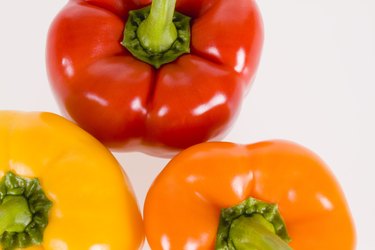
Carnitine is a compound that your body makes to help you burn fat and remove cellular toxin. Your body maintains a fairly constant level of carnitine with the production in the liver and kidneys balanced with the excretion and reuptake by the kidneys. Generally your body makes sufficient carnitine to meet your daily needs, and your kidneys are quite efficient in conserving carnitine when the level falls. Even with a carnitine-deficient diet, a healthy person rarely has carnitine deficiency.
Healthy Vegans Do Not Need Carnitine
Video of the Day
The best food sources of carnitine are animal products, including meats and dairies, but vegans who strictly avoid these products generally do not get carnitine deficiency. Human liver and kidney make carnitine from lysine and methionine, two amino acids that you derive from protein intake. Other nutrients are required, including iron, and vitamins C, B-3 and B-6, according to Oregon State University. If you have normal liver and kidney functions and balanced nutrition, you most likely will not develop carnitine deficiency.
Video of the Day
Vegans with Kidney Disease
Vegans with chronic kidney disease, especially those who have end-stage kidney disease and receive hemodialysis, might need carnitine supplements, according to the Office of Dietary Supplements. Diseased kidneys make less carnitine while eliminating more from the body, putting the person at greater risk of carnitine deficiency. This is a particular concern for vegans because a vegan diet provides little carnitine. Although some plant foods such as avocado, asparagus and whole wheat bread contain carnitine, the amounts are often tens to hundreds of times lower than in animal products.
Other Causes of Carnitine Deficiency
Although generally not a concern for vegans, vitamin C deficiency can impair body production of carnitine and incur deficiency. Oregon State University states that fatigue, an early sign of vitamin C deficiency, is related to carnitine deficiency. Iron deficiency is a common nutrition concern for vegans, according to a review article in December 2010 issue of "Nutrition in Clinical Practice." Iron deficiency can reduce carnitine synthesis and increase the need for carnitine from food or supplements. Dried fruits like prunes, apricots and raisins, legumes, whole grains, iron-fortified foods and vegetables such as spinach, broccoli and asparagus provide good sources of iron for vegans, based on data by the National Institutes of Health. You can improve iron absorption from plant source by consuming vitamin C-rich food such as strawberry and orange in the same meal.
Meeting the Need for Carnitine
Vegans deficient in carnitine can obtain it from supplements. Two types of carnitine supplements are available in the U.S.: L-carnitine and acetyl-L-carnitine. Acetyl-L-carnitine is better absorbed and can cross the blood-brain barrier, according to the Office of Dietary Supplements. But if you want a cheaper source, choose L-carnitine. These supplements are generally used in a dose range of 1 to 3 g a day. Doses higher than 5 g might cause unpleasant side effects, including diarrhea. Check with your doctor before starting carnitine supplement.
- The Office of Dietary Supplements; Carnitine; June 2006
- Oregon State University; L-Carnitine; October 2002
- The University of Maryland Medical Center; Carnitine (L-Carnitine); March 2009
- MedlinePlus; Iron in Diet; March 2009
- "Nutrition in Clinical Practice"; Nutrition concerns and health effects of vegetarian diets; December 2010